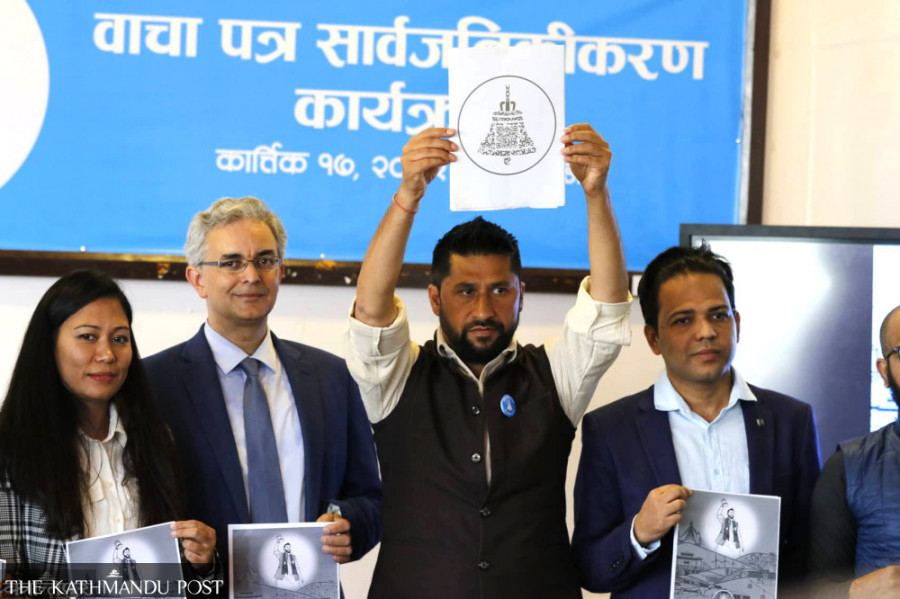Columns
RSP: Rise and risks
Certain concepts floating in the orbit of political science may explain what is going on with RSP.
Sucheta Pyakuryal
Rastriya Swatantra Party’s birth took place amid extreme apathy and disdain for the existing political parties. In the last three decades, the old parties, who were at one time harbingers of human dignity and freedom for the Nepali people, have now morphed to become political machines fraught with political patronage, nepotism and systemic corruption. Intense collective disappointment towards the old parties led to the RSP’s rise as a national party in such a short period. One, therefore, wonders why a party which supposedly stands to thwart the old decay and muck in politics is completely comfortable becoming a part of the old muck.
Certain concepts floating in the orbit of political science may explain what is going on with RSP. The first one that comes to mind is “cooptation.” A term that basically explains how sharing the responsibility of power as opposed to the power itself is one of the most useful manipulations in governance. The concept was later borrowed to be used in public management where co-opting a group involves giving its leader—someone like Rabi Lamichhane in our case, or someone the group respects, like Sumana Shrestha—a key role in the implementation process. This, however, is not a form of participation, as those who hold the power strings do not want the advice of the coopted, merely their endorsements. The recent reshuffling is being done by those who know the utility of cooptation well, especially when the opposition is a politically naïve, ambitious and impatient actor like RSP.
The second concept that comes to mind is "retainership," which explains how, when appointees lacking in merit retain their status, they become a powerful political force. Compounded by their want of qualifications, they form self-protective networks to safeguard their special interests, especially their right to stay in office. The term “retainers” was used to describe these individuals who, after holding office for enough time, become so well entrenched systemically that they successfully resist any change or reform. These retainers are granted positions by superior authorities based on personal and partisan considerations. They tend to cultivate formal or informal associations to strengthen their hold on office and their ability to resist reforms that may replace them.
In the case of Nepal, retainers of the old political parties have been forming associations, and now it seems they are courting RSP just so their conglomeration remains intact. The questions remain: Will they be successful in turning the RSP cadre into one of them? Are we seeing the start of sub-par political retainers getting cultivated inside the RSP as well?
The third thesis that appears relevant to the RSP scenario is that of “groupthink”. Humanity rediscovered “organising” in the late 18th/early 19th centuries when the Industrial Revolution dismantled the template of how society operated. While the factories were being forced to “organise” for better efficiency, the groups and subgroups of people who worked inside these factories also discovered the power of organising to acquire political leverage. The workers banded together and structured themselves as “unions” to have their voices heard. Suddenly there was a general realisation, i.e., to get things done, organising is mandatory, and maybe that is why political parties were projected as mandatory for liberal and social democracies. The need for “organising” in the modern political space was felt by both theorists and practitioners. In Nepal, too, the intense disdain towards political parties needed a platform; therefore, after a decade of disappointments, RSP, an organisation in the form of a political party, was born.
According to the theorists, however, there are also downsides to formal organising. Once an organisation is formed, effectiveness replaces ethics, one’s role inside a party replaces the person that one is, hierarchy replaces ideas, command replaces dialogue, psychological power replaces ideological power, team replaces an individual and teamwork replaces mastery. It is amid these replacements that “groupthink” starts taking root. In the midst of organising, one cannot help but wonder if groupthink has seeped into RSP. Being a nascent political party, the one thing RSP cannot afford at any cost at the moment is factionalism or disharmony inside the party. It must stand together, tall and strong, and it is this very need of RSP that makes it extremely vulnerable to groupthink.
Groupthink is a psychological phenomenon that occurs when a group of people are acutely aware that they cannot afford disharmony or nonconformity, which leads to irrational and, at times, even dysfunctional decision-making. High conformity in a group produces behaviour that does not resort to dissenting or even critiquing and that slowly erodes democratic behaviour within a group.
Lamichhane has certain flamboyance and political panache that attract a large middle rung, which is important for the RSP. He may also have the rustic political savvy that, so far, has served him well. What he does not seem to have is a principled political bent of mind and mature political foresight. Recent incidents that surfaced via social media have also raised questions about his personal ethics. One also does not know much about his commitment to democratic ideals. Given all these, when erudite party members who are also star parliamentarians speak on his behalf with the utmost fervour, one wonders if there is that “agentic shift” that is already taking place within these individuals.
Whatever the case, Nepal cannot afford to lose honest parliamentarians to the residual retainer culture, political cooptation or a banal phenomenon such as groupthink. It would have been politically wise to gauge and craft strategies as to how to sweep the muck in 2084 without rolling in it. RSP should be aware of the threats surrounding it.




 16.16°C Kathmandu
16.16°C Kathmandu















